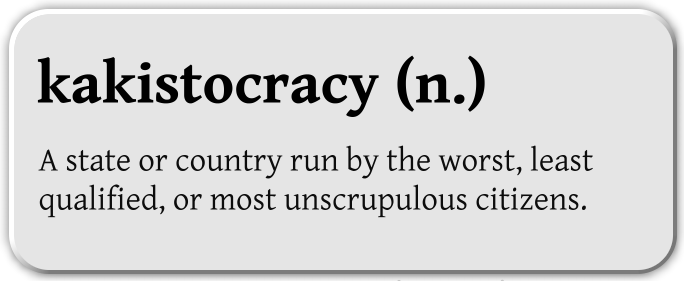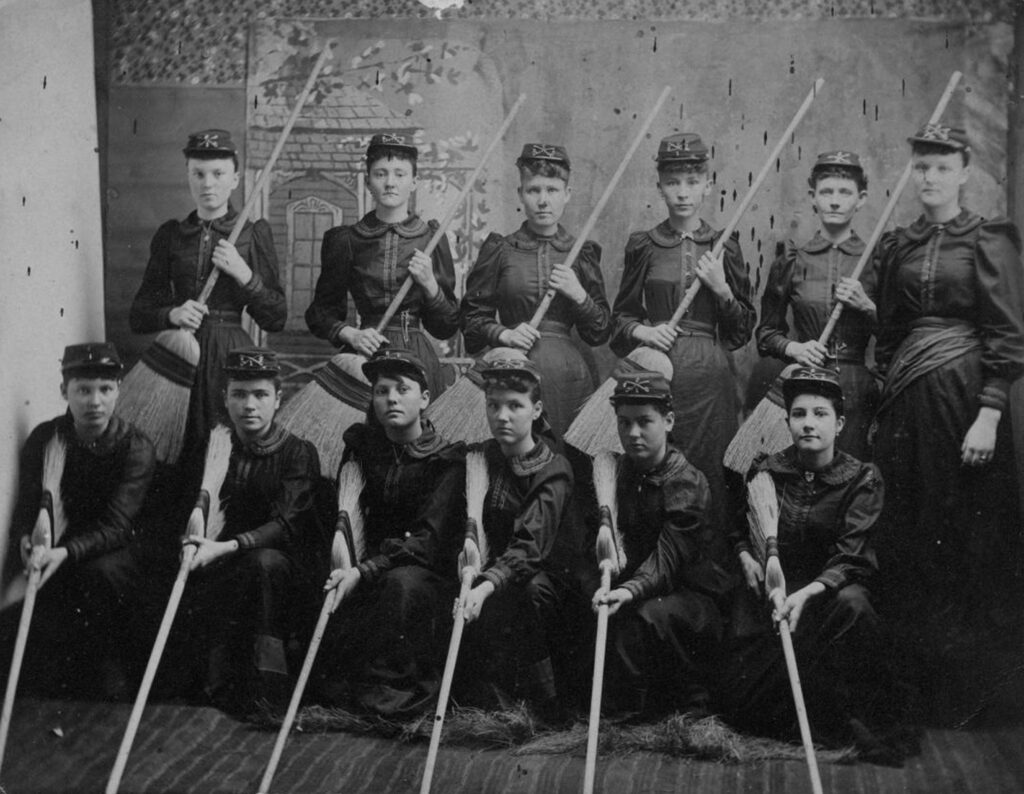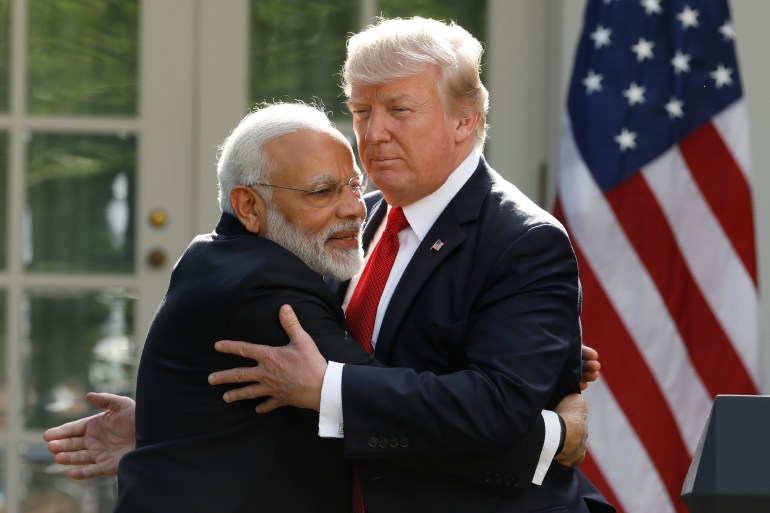When a long train of abuses and usurpations… evinces a design to reduce them under absolute Despotism, it is their right, it is their duty, to throw off such Government.
—Declaration of Independence (1776)
 We are now struggling to emerge from the wreckage of a constitutional republic, transformed into a kleptocracy (government by thieves), collapsing into kakistocracy (government by the worst), and enforced by a police state algogracy (rule by algorithm).
We are now struggling to emerge from the wreckage of a constitutional republic, transformed into a kleptocracy (government by thieves), collapsing into kakistocracy (government by the worst), and enforced by a police state algogracy (rule by algorithm).
This week alone, the Trump administration is reportedly erecting protest barricades around the White House, Congress is advancing legislation that favors the wealthy, and President Trump is grandstanding at the opening of a detention center dubbed “Alligator Alcatraz.”
Against such a backdrop of government-sponsored cruelty, corruption and shameless profiteering at taxpayer expense, what, to the average American, is freedom in an age when the government plays god—determining who is worthy of rights, who qualifies as a citizen, and who can be discarded without consequence?
What are inalienable rights worth if they can be redefined, delayed, or revoked by executive order?
Frederick Douglass posed a similar challenge more than 170 years ago when he asked, “What, to the American slave, is your Fourth of July?”
His question was a searing indictment not just of slavery but of a government that proclaimed liberty while denying it to millions—a hypocrisy that persists in a system still governed by institutions more committed to power than principle.
Every branch of government—executive, legislative, and judicial—has, in one way or another, abandoned its duty to uphold the Constitution. And both parties have prioritized profit and political theater over justice and the rights of the governed.
The founders of this nation believed our rights come from God, not government. That we are born free, not made free by bureaucrats or judges. That among these rights—life, liberty, and the pursuit of happiness—none can be taken away without destroying the very idea of government by consent.
And yet that is precisely what’s happening.
We now live under a government that has become judge, jury, and executioner—writing its own laws, policing its own limits, and punishing those who object.
This is not what it means to be free.
When presidents rule by fiat, when agencies strip citizenship from naturalized Americans, when police act as both enforcers and executioners, and when courts rubber-stamp the erosion of basic protections, the distinction between a citizen and a subject begins to collapse.
What do inalienable rights mean in a country where:
- Your citizenship can be revoked based solely on the government’s say-so?
- Your freedom can be extinguished by surveillance, asset seizure, or indefinite detention?
- Your property can be taken, your speech censored, and your life extinguished without due process?
- Your life can be ended without a trial, a warning, or a second thought, because the government views you as expendable?
The answer is stark: they mean nothing—unless we defend them.
When the government—whether president, Congress, court, or local bureaucrat—claims the right to determine who does and doesn’t deserve rights, then no one is safe. Individuals become faceless numbers. Human beings become statistics. Lives become expendable. Dignity becomes disposable.
It is a slippery slope—justified in the name of national security, public safety, and the so-called greater good—that leads inevitably to totalitarianism.
Unfortunately, we have been dancing with this devil for far too long, and now, the mask has come off.
This is what authoritarianism looks like in America today.
Imagine living in a country where government agents crash through doors to arrest citizens merely for criticizing government officials. Where police stop and search you on a whim. Where carrying anything that resembles a firearm might get you arrested—or killed. Where surveillance is constant, dissent is criminalized, and loyalty is enforced through fear.
If you’re thinking this sounds like America today, you wouldn’t be far wrong.
But this scenario isn’t new. It’s the same kind of tyranny that drove American colonists to sever ties with Great Britain nearly 250 years ago.
Back then, American colonists lived under the shadow of an imperial power and an early police state that censored their speech, surveilled their movements, taxed their livelihoods, searched their homes without cause, quartered troops in their towns, and punished them for daring to demand liberty.
It was only when the colonists finally got fed up with being silenced, censored, searched, frisked, threatened, and arrested that they finally revolted against the tyrant’s fetters.
The Declaration of Independence—drafted by Thomas Jefferson and signed on July 4, 1776, by 56 men who risked everything—was their response. It was more than a list of grievances. It was a document seething with outrage over a government which had betrayed its citizens, a call to arms against a system that had ceased to represent the people and instead sought to dominate them.
Labeled traitors, these men were charged with treason, a crime punishable by death, because they believed in a radical idea: that all people are created to be free. For some, their acts of rebellion would cost them their homes and their fortunes. For others, it would be the ultimate price—their lives.
Yet even knowing the heavy price they might have to pay, these men dared to speak up. They understood that silence in the face of tyranny is complicity. So they stood together, pledging “our Lives, our Fortunes, and our sacred Honor” to the cause of freedom.
Even after they had won their independence from Great Britain, these new Americans worked to ensure that the rights they had risked their lives to secure would remain secure for future generations.
The result: our Bill of Rights, the first ten amendments to the Constitution.
The Constitution and Bill of Rights were meant to enshrine the liberties they fought for: due process, privacy, free speech, the right to bear arms, and limits on government power.
Now, nearly two and a half centuries later, those freedoms hang by a thread.
Imagine the shock and outrage these 56 men would feel were they to discover that almost 250 years later, the government they had risked their lives to create has been transformed into a militaristic police state in which exercising one’s freedoms—at a minimum, merely questioning a government agent—is often viewed as a flagrant act of defiance.
In fact, had Jefferson and his compatriots written the Declaration of Independence today, they would almost certainly be labeled extremists, placed on government watchlists, targeted by surveillance, and prosecuted as domestic threats.
Read the Declaration of Independence again, and you’ll see the grievances they laid at the feet of King George—unjust laws, militarized policing, surveillance, censorship, and the denial of due process—are the very abuses “we the people” suffer under today.
Had Jefferson written the Declaration about the American police state in 2025, it might have read like a criminal indictment of the crimes perpetrated by a government that:
Polices by fear and violence:
Surveils and represses dissent:
Strips away rights:
Concentrates unchecked power in the executive:
- bypassing Congress with executive orders, sidelining the courts, and ruling by decree;
- weaponizing federal agencies to suppress opposition and silence critics;
- treating constitutional limits as optional and the presidency as a personal fiefdom.
These are not isolated abuses.
They are the logical outcomes of a government that has turned against its people.
They reveal a government that has claimed the god-like power to decide who gets rights—and who doesn’t. Who counts as a citizen—and who doesn’t. Who gets to live—and who becomes expendable.
All along the spectrum of life—from the unborn child to the elderly—the government continues to treat individuals endowed by their Creator with certain unalienable rights as if they are criminals, subhumans, or enemies of the state.
 That is not freedom. It is tyranny.
That is not freedom. It is tyranny.
And it must be called by its true name.
The truth is hard, but it must be said: the American police state has grown drunk on power, money, and its own authority.
The irony is almost too painful to articulate.
On the anniversary of the signing of the Declaration of Independence—a document that rebuked government corruption, tyranny, and injustice—we find ourselves surrounded by its modern-day equivalents.
This week’s spectacle—protest barricades, legislation to benefit the rich, and Trump’s appearance at Alligator Alcatraz, a.k.a. “Gator Gitmo”—shows how completely we have inverted the spirit of 1776.
That a president would celebrate the Fourth of July while inaugurating a modern-day internment camp—far from the reach of the courts or the Constitution—speaks volumes about the state of our nation and the extent to which those in power now glorify the very forms of tyranny the Founders once rose up against.
This is not law and order.
This is political theater, carceral cruelty, and authoritarianism in plain sight.
It is what happens when a nation that once prided itself on liberty now builds monuments to its own fear and domination.
The spectacle doesn’t end with detention camps and barricades. It extends into commerce, corruption, and self-enrichment at the highest levels of power.
President Trump is now marketing his own line of fragrances—a branding exercise so absurd it would be laughable if it weren’t a flagrant violation of the Constitution’s Emoluments Clause. His investments are booming. And all across his administration, top officials are shamelessly using public office to line their pockets, even as they push legislation to strip working-class Americans of the most basic benefits and protections, while claiming to be rooting out corruption and inefficiency.
This is not governance. This is kleptocracy—and it is happening in plain sight.
In the nearly 250 years since early Americans declared their independence from Great Britain, “we the people” have worked ourselves back under the tyrant’s thumb—only this time, the tyrant is one of our own making.
The abuses they once suffered under an imperial power haven’t disappeared. They’ve evolved.
We are being robbed blind by political grifters and corporate profiteers. We are being silenced by bureaucrats and blacklists. We are being watched by data miners and digital spies. We are being caged by militarized enforcers with no regard for the Constitution. And we are being ruled by presidents who govern not by law, but by executive decree.
Given the fact that we are a relatively young nation, it hasn’t taken very long for an authoritarian regime to creep into power.
Unfortunately, the bipartisan coup that laid siege to our nation did not happen overnight.
The architecture of oppression—surveillance, militarism, censorship, propaganda—was built slowly, brick by brick, law by law, war by war.
It snuck in under our radar, hiding behind the guise of national security, the war on drugs, the war on terror, the war on immigration, political correctness, hate crimes and a host of other official-sounding programs aimed at expanding the government’s power at the expense of individual freedoms.
The building blocks for the bleak future we’re just now getting a foretaste of—police shootings of unarmed citizens, profit-driven prisons, weapons of compliance, a wall-to-wall surveillance state, pre-crime programs, a suspect society, school-to-prison pipelines, militarized police, overcriminalization, SWAT team raids, endless wars, etc.—were put in place by government officials we trusted to look out for our best interests.
The result is an empire in decline and a citizenry under siege.
But if history teaches us anything, it’s that the power of the people—when awakened—is stronger than any empire.
For decades, the Constitution has been our shield against tyranny.
But today, it’s under siege. And now we must be the shield.
Surveillance is expanding. Peaceful dissent is being punished. Judges are being targeted. The presidency is issuing decrees and bypassing the rule of law.
Every institution meant to check power is being tested—and in some cases, broken.
This is the moment to stand in front of the Constitution and defend it.
As I make clear in my book Battlefield America: The War on the American People and in its fictional counterpart The Erik Blair Diaries, the fight for freedom is never over. But neither is it lost—so long as we refuse to surrender, refuse to remain silent, and refuse to accept tyranny as the price of safety.
It is time to remember who we are. To reclaim the Constitution. To resist the march toward authoritarianism. And to reassert—boldly and without apology—that our rights are not up for negotiation.







.jpg)












